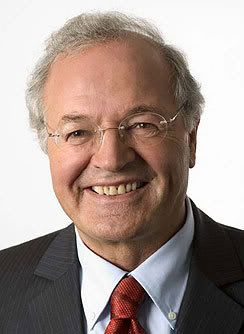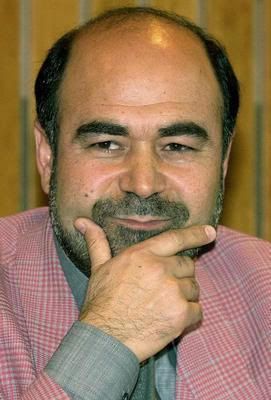 Professor Dr. Hakki Keskin (born 1943 in Turkey), is a model "Germano-Turk".
Professor Dr. Hakki Keskin (born 1943 in Turkey), is a model "Germano-Turk".He is a professor of Political Science and was the first "German of Turkish descent" (as the politically correct definition goes) to become a member of a German parliament (the Bürgerschaft in Hamburg), and the founder of the Türkische Gemeinde in Deutschland is seen as one of the prominent leaders of the country's Turkish community. In fact, he was one of the Turkish deputies who accompanied German Chancellor Angela Merkel to Turkey last October.
Hakki Keskin is known for unapologetic statements like
the EU must not be reduced to Christian values onlyor for dubbing then CDU-chair Angela Merkels musings on a Turkish EU-membership (she was against it) as a
kind of declaration of war against Turkey and the Turks living in Germany*or his disappointment at the SPD's "neo-liberal" social and economic reforms which, so the professor, have hit poorer Turks.
In the meantime, Hakki has become somewhat of a loose cannon. He is giving interviews to Turkish newspapers and TV stations, denying (or at least substantially relativising) the Armenian genocide by the Turks. SPIEGEL ONLINE asked Keskin for a clarification, which they, indeed, got.
There is "no proof of a genocide", so Keskin. Yes, Armenians died, "but was this a planned and intended destruction of the armenian population?", asked Keskin. At that time, "hundredthousands of Turks were killed" as well, which was not recognised by the "biased reporting in the European media".Predictably, Hakki's party is all in a flutter now, but our multi-ethnic paragon refuses to budge. (Oh yes, I ought to mention that he had in June 2005 withdrawn from the Social Democratic Party and joined the post-Communist DIE LINKE -- The Left -- party for which he became a member of the Bundestag after the September 2005 elections.)
Isn't that a wonderful omen for a parlamentarian cooperation between Germany and Turkey? And the man doesn't even have the hackneyed excuse of being poorly educated.
 The same applies to another, sadly long forgotten, controvery that was started by another hyphen-German in April 2002 when Jamal Karsli, a "German of Syrian descent", member of the Northrhine-Westphalian state parliament, was forced to resign from the Green Party after accusing Israel of using "Nazi methods". He also criticised, proving that he was not a man of really original notions, the "frightening influence of the Zionist lobby" in an interview to the mouthpiece of the youth organisation of the NPD, the Nationaldemokratische Partei Deutschlands Junge Freiheit on 3. May 2002. Subsequently, Karsli was welcomed into the ranks of the FDP (Free Democratic Party) by their deputy chairman Jürgen Möllemann, who also headed (surprise, surprise!) the DAG, i.e. the German-Arab Association, an important lobby for business with the Middle East.
The same applies to another, sadly long forgotten, controvery that was started by another hyphen-German in April 2002 when Jamal Karsli, a "German of Syrian descent", member of the Northrhine-Westphalian state parliament, was forced to resign from the Green Party after accusing Israel of using "Nazi methods". He also criticised, proving that he was not a man of really original notions, the "frightening influence of the Zionist lobby" in an interview to the mouthpiece of the youth organisation of the NPD, the Nationaldemokratische Partei Deutschlands Junge Freiheit on 3. May 2002. Subsequently, Karsli was welcomed into the ranks of the FDP (Free Democratic Party) by their deputy chairman Jürgen Möllemann, who also headed (surprise, surprise!) the DAG, i.e. the German-Arab Association, an important lobby for business with the Middle East.The ensueing spat was further intensified when Möllemann expressed understanding for Palestinian suicide bombers. After he had accused Israel’s Prime Minister Ariel Sharon and the then vice president of the Jewish Community in Germany, Michel Friedman, of inciting antisemitism in Germany (don't we all know that antisemitism is the Jews' fault?), a bitter conflict between the Jewish community and the FDP broke out. Then-Chancellor Gerhard Schröder and Foreign Minister Joschka Fischer (who had dubbed the incident the 'Haiderisation' of the Free Democrats) interfered, denouncing Möllemann’s statements. Paul Spiegel, president of the Central Council of Jews in Germany, said that Möllemann's revival of the old Nazi mantra that Jews themselves are responsible for antisemitism was the biggest anti-Jewish insult made by a political party-representative in the history of the Federal Republic. Karsli later resigned from the FDP, but the debate continued and antisemitism became an issue for the first time in a postwar German election campaign.
And here am I, thinking that we simple and unhyphenated Germans had a lousy political style.
* (For that and other statements go to the press release section of the Türkische Gemeinde in Deutschland website.)

No comments:
Post a Comment